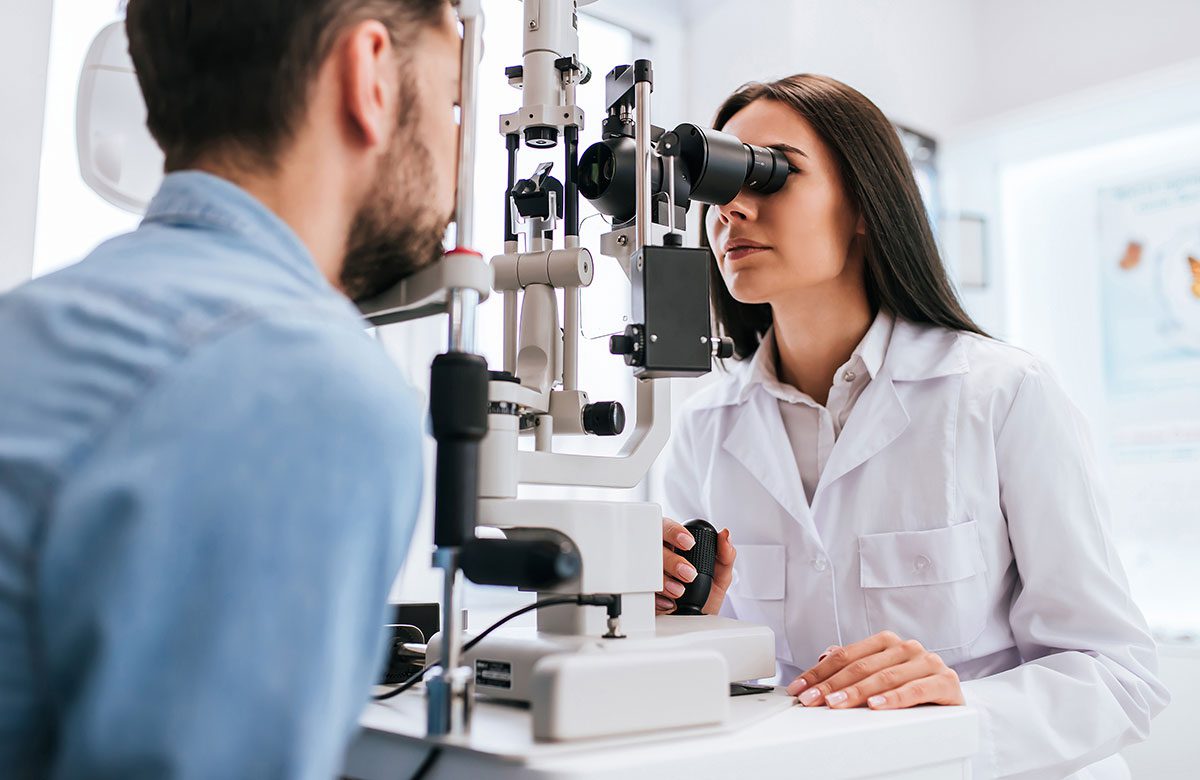Routine Eye Exam
Regular eye exams are an essential part of maintaining good eye health and detecting potential vision problems early. Even if you have no symptoms or concerns, it’s important to have regular eye exams to ensure that your eyes are healthy and functioning properly.

What is a Routine Eye Exam?
A routine eye exam is a comprehensive examination of your eyes, which includes several tests to evaluate your vision and overall eye health. Your eye doctor will typically start with a review of your medical history and any medications you may be taking, followed by a series of tests to check your vision, eye movements, and eye pressure.
Why Are Routine Eye Exams Important?
Routine eye exams are important for several reasons:
Early Detection of Vision Problems: Many eye diseases and vision problems, such as glaucoma and macular degeneration, have no symptoms in their early stages. Regular eye exams can detect these problems early, when they are most treatable.
Prevention of Vision Loss: Early detection and treatment of eye diseases can prevent or slow down vision loss. Routine eye exams can help you maintain your vision and prevent unnecessary vision loss.
Detection of Other Health Problems: Your eyes can provide important clues about your overall health. Routine eye exams can detect systemic diseases, such as diabetes and high blood pressure, which can have an impact on your eyes and your overall health.
Update Your Prescription: Routine eye exams can also help you keep your prescription up-to-date, which can improve your vision and quality of life.
How Often Should You Have a Routine Eye Exam?
The frequency of your eye exams will depend on several factors, such as your age, overall health, and any eye problems or conditions you may have. As a general guideline, the American Academy of Ophthalmology recommends:
Children should have their first eye exam at 6 months of age, followed by exams at age 3 and age 5, and then every 1-2 years after starting school.
Adults ages 20-39 with good eye health should have an eye exam every 1-2 years.
Adults ages 40-64 should have an eye exam every 2-4 years.
Adults over age 65 should have an eye exam every 1-2 years.
If you have a history of eye problems or conditions, or if you have a chronic health condition such as diabetes, you may need to have more frequent eye exams. Your eye doctor can recommend a schedule of exams based on your individual needs.
Will this be covered under vision insurance or medical insurance?
Medical insurance and vision insurance are two different types of insurance policies that serve different purposes. Understanding the differences between these two types of insurance can help you make informed decisions about your healthcare coverage.
Medical Insurance:
Medical insurance is designed to cover expenses related to medical care for illnesses and injuries, such as doctor visits, hospital stays, surgeries, and prescription medications. It is typically offered by employers as part of a benefits package or purchased individually. Medical insurance is regulated by federal and state laws, and its coverage and cost vary widely depending on the policy.
Medical insurance policies typically have deductibles, co-payments, and co-insurance requirements, which means you pay a portion of the costs for covered medical services. Medical insurance may also have annual or lifetime limits on coverage.
Vision Insurance:
Vision insurance is a type of insurance policy that covers routine eye care and vision-related services, such as eye exams, eyeglasses, and contact lenses. It is usually offered as a separate policy or as part of an employer’s benefits package.
Unlike medical insurance, vision insurance usually does not cover medical issues related to the eyes, such as treatment for glaucoma, cataracts, or diabetic retinopathy. These conditions are typically covered under a medical insurance policy.
Vision insurance policies usually have annual premiums, deductibles, and co-payments or co-insurance requirements. Some vision insurance plans may also have limits on the amount of coverage provided for certain services, such as eyeglasses or contact lenses.
In summary, medical insurance is designed to cover medical care related to illnesses and injuries, while vision insurance is designed to cover routine eye care and vision-related services. It’s important to understand the differences between these two types of insurance policies and their coverage limits, so you can make informed decisions about your healthcare coverage needs.
What is a refraction?
A refraction is an important part of an eye exam that measures your ability to see clearly at different distances. During a refraction, the eye doctor will ask you to look through a device called a phoropter and evaluate different lenses to determine which ones provide you with the clearest and most comfortable vision. This process helps the doctor determine if you need glasses or contact lenses to correct any vision problems you may have, such as nearsightedness, farsightedness, or astigmatism.
The refraction is conducted after a comprehensive eye exam, which assesses your overall eye health and checks for any potential eye diseases or conditions. The information gathered during the refraction, along with the findings from the comprehensive eye exam, is used to create a prescription for glasses or contact lenses that is tailored to your individual vision needs.
It’s important to have a refraction regularly, as your vision can change over time. Regular eye exams and refractive testing can help you maintain optimal visual acuity and ensure that you are always seeing as clearly as possible. If you have any concerns about your vision or need to schedule an eye exam, be sure to contact your eye doctor.
Conclusion
Regular eye exams are an essential part of maintaining good eye health and detecting potential vision problems early. By having routine eye exams, you can ensure that your eyes are healthy and functioning properly, and prevent or slow down vision loss. If it’s been a while since your last eye exam, schedule an appointment with your eye doctor today to ensure the health of your eyes.
